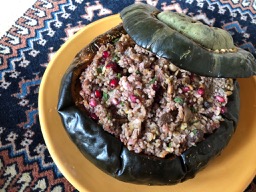Cook! For Goodness Sake!
A Peace Meal for the New Year
By Linda Garrettson
I think it was Einstein who said that true intelligence is the ability to see the similarities not the differences. If so, what could be a better metaphor for smarts than a good meal of regional foods shared among regional people, despite religious, cultural, or any other differences?
I like to think of myself as a bridge builder. It is with that spirit I created this Middle Eastern recipe for the approaching holidays and new year. It is packed with foods enjoyed universally in an area historically marked by conflict.
The Mediterranean boasts many healthy foods. Abundant in whole grains, fruits, nuts, seeds, and vegetables, this region provides an excellent basis for longevity and community gatherings. It is on those kitchen and dining room tables where the similarities outweigh the differences.
My recipe includes freekeh from Canaan, West Bank, not Connecticut. In foodie-speak, this roasted green wheat adds a smoky aroma and a unique savory taste. I’ve included pomegranate seeds, raisins, walnuts, lemon, and pine nuts, all grown and eaten in Israel and Palestine. The mixture is stuffed in a Japanese squash if you really want to think melting pot in one dish. The truth is that kabocha squash makes a better bowl than butternut squash that is more typical of the region. Forgive me for stretching the geographical borders a bit – nothing exclusionary here.
My hope for this holiday season and the new year is that we can be reminded of what brings us together, not what separates us. There is no better way to achieve this than by sharing a good meal among friends and family, full of diversity and healthy foods.

Whole grains, fruits, nuts, and squash are foods shared in Israel and Palestine.
Peace Bowl
Ingredients:
3-4lb. kabocha squash, seeded and top removed
1-2 tsps. extra virgin olive oil
1 cup freekeh, rinsed (brown rice can be substituted)
Pinch sea salt
1-2/3 cup of water
1 medium onion, diced
Low sodium vegetable broth
½ cup of toasted walnuts
½ cup of pine nuts
½ tsp. cinnamon
½ tsp. nutmeg
1 tsp. sea salt
Freshly ground pepper
3-4 tbsp. of finely chopped Italian parsley
Zest and juice of one lemon
Seeds from one pomegranate
Method:
• Preheat the oven to 375˚
• Cut the top off the squash. Scoop out the seeds, and rub the skin with a small amount of olive oil.
• Place the squash bowl and top in an ovenproof pan and roast for 30 minutes. Remove the top and continue to bake the bowl for another 15 minutes or until the flesh can be easily pierced with a fork.
• Meanwhile, rinse the freekeh in cold water and drain. Boil 1-2/3 cups of water, add the freekeh and a pinch of sea salt. Simmer covered for 30 minutes.
• In a separate pan sauté the onion in vegetable broth until soft. Remove from the heat and stir in the walnuts, pine nuts, cinnamon, nutmeg, salt, pepper, parsley, lemon and zest, and pomegranate seeds. Add the freekeh and mix well.
• Spoon the hot stuffing into the cooked squash bowl. For the sake of presentation, cover with the squash top or “hat.”
• To serve, remove the “hat” and slice.
Serves 6-8
*Note: Here’s a tip for removing pomegranate seeds easily:
Cut the pomegranate in half horizontally. If you do this over a bowl you can catch the delicious juice. Squeeze the halves to loosen the seeds then tap the rind firmly with a heavy spoon. Any seeds that refuse to leave the shell can be removed with a small fork.
